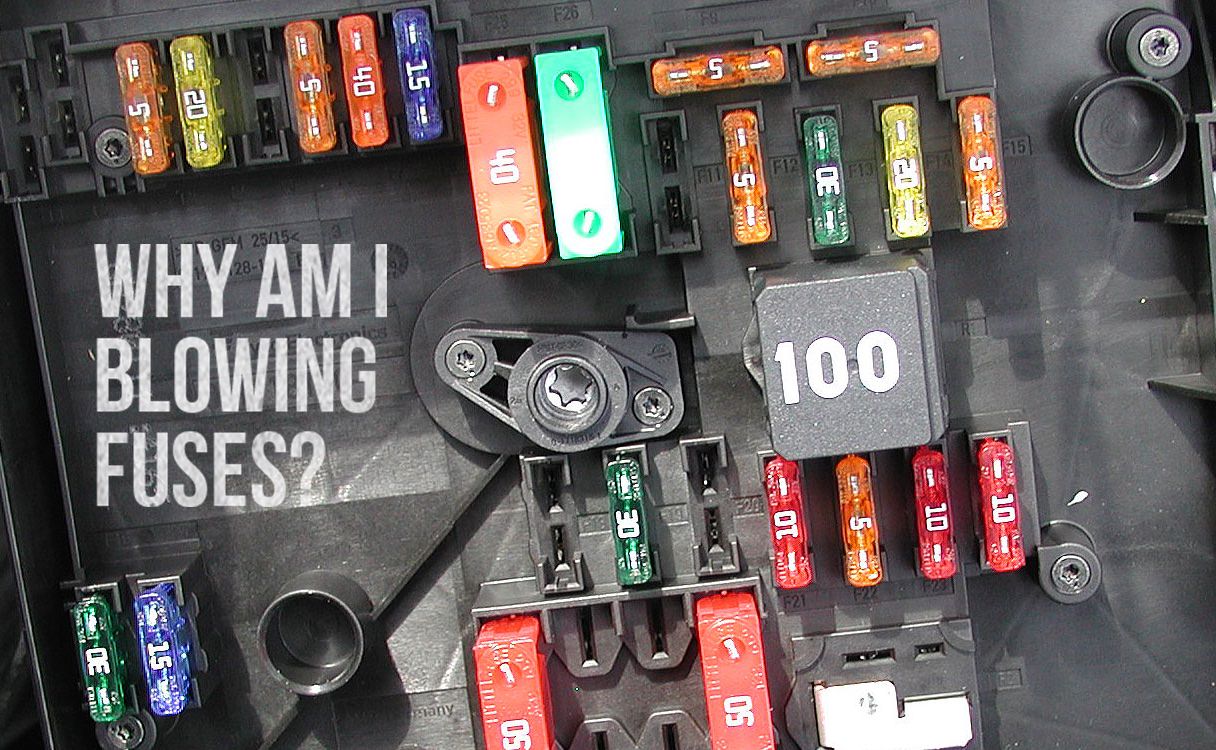Starter Fuse Keeps Blowing
If your starter fuse keeps blowing, check for short circuits or a faulty starter. Repair or replace as necessary.
Dealing with a blown starter fuse can be frustrating and leave you stranded. When this happens, it is important to identify the root cause of the issue to prevent it from happening again. By taking the time to troubleshoot and address the problem, you can ensure that your vehicle starts reliably every time.
We will discuss common reasons why a starter fuse may keep blowing and provide steps on how to diagnose and fix the issue. Let’s dive into the details to get your vehicle back on the road smoothly and safely.
Common Causes
The starter fuse blowing repeatedly can be caused by various factors such as a short circuit in the electrical system, a faulty starter motor, or issues with the wiring. Identifying and addressing the underlying cause is essential to ensure proper functioning of the vehicle’s electrical system.
Short Circuit
A short circuit is one of the most common causes of a blown starter fuse. This occurs when a wire’s insulation is damaged, allowing it to come in contact with another wire or a metal component. This contact creates a direct path for current to flow, overwhelming the circuit and causing the fuse to blow. Regular inspections of the wiring and components for signs of wear and tear can help prevent short circuits.
Overloading
Overloading the starter circuit with excessive current can also lead to blown fuses. This may happen when the starter is required to engage repeatedly in a short period, causing a surge in current that the fuse cannot handle. Regular maintenance, including cleaning and lubricating the starter components, can help prevent overloading and subsequent fuse blowing.

Credit: parksidemotors.ca
Identifying The Issue
Starter fuse keeps blowing? No worries. Let’s narrow down the problem by identifying the issue.
Visually Inspecting The Wiring
Examine the wiring for any signs of damage or loose connections. Look for exposed wires or burnt areas that indicate a short circuit. Address any visible issues promptly.
Using A Multimeter
Grab a multimeter to accurately measure voltage and resistance in the circuit. Test the fuse and connections for proper continuity to pinpoint the faulty component.
Troubleshooting Steps
When troubleshooting a starter fuse that keeps blowing, it’s essential to follow proper steps to identify and resolve the issue. Here are the key troubleshooting steps you can take:
Checking For Loose Connections
- Inspect all electrical connections for any signs of looseness or damage.
- Ensure all wiring is secure and properly connected to the fuse box.
Inspecting Appliances And Devices
- Check all appliances and devices connected to the circuit for any visible damage.
- Look for any signs of malfunction or wear and tear that may be causing the fuse to blow.
Testing The Fuse
- Using a multimeter, test the fuse to determine if it is still functional.
- Check for continuity to ensure the fuse is conducting electricity properly.
Replacing The Fuse
- If the fuse is faulty, replace it with a new one of the same amperage rating.
- Make sure to reset the circuit breaker and test the appliances to ensure the issue is resolved.

Credit: m.youtube.com
Seeking Professional Help
When To Consult An Electrician
If you find yourself in a situation where your starter fuse keeps blowing despite your best efforts, it may be time to seek the expertise of a professional electrician. Repeated blown fuses are a clear indicator of an underlying electrical issue that requires attention. It’s crucial to call in a professional if you lack the necessary skills and knowledge to diagnose and rectify the problem. Unaddressed electrical problems can pose serious safety hazards, and attempting to resolve complex issues without the proper expertise can lead to further damage.
Common Signs That Warrant Professional Assistance
Here are some common signs that indicate it’s time to seek professional help:
- Frequent blown fuses despite replacing them
- Burning smell or visible signs of burnt components
- Sparks or electrical arcing
- Inconsistent power supply or irregular electrical behavior
When confronted with these warning signs, it’s essential to prioritize your safety and that of your property by consulting a qualified electrician. Ignoring these indicators can result in further damage, increased safety risks, and potentially higher repair costs down the line.
Preventing Future Blown Fuses
Preventing future blown fuses is crucial to maintaining the functionality of your electrical system and avoiding potential hazards. Understanding the steps you can take to prevent blown fuses can save you time, money, and frustration in the long run. By following these simple guidelines, you can ensure the safety of your home and electrical appliances.
Avoid Overloading Circuits
One of the main culprits behind blown fuses is overloading circuits. When you connect too many appliances to a single circuit, it can overload the system and cause the fuse to blow. To prevent this, it’s important to be mindful of the electrical load each circuit can handle.
Here are a few tips to avoid overloading circuits:
- Know the amperage rating of your circuits and do not exceed it.
- Distribute your appliances evenly across different circuits instead of plugging them all into one.
- Use power strips with built-in surge protectors to prevent excessive power draw.
Replace Faulty Appliances
Faulty appliances can also be a common cause of blown fuses. When appliances malfunction, they can create electrical shorts or draw too much current, leading to blown fuses. It’s important to address faulty appliances as soon as you notice any issues to prevent further damage.
Here’s what you can do to replace faulty appliances:
- Regularly check your appliances for any signs of damage or malfunction.
- If an appliance is causing fuses to blow repeatedly, consider having it inspected by a professional.
- Do not attempt to repair or use appliances that show signs of electrical problems.
Updating Wiring
Outdated or faulty wiring can also contribute to blown fuses. Over time, the insulation around wires can deteriorate, leading to shorts and electrical hazards. By updating your wiring, you can ensure a safer, more efficient electrical system.
Consider these steps when updating wiring:
- Hire a licensed electrician to assess the condition of your wiring.
- If your wiring is outdated, have it replaced by a professional.
- Make sure your home’s electrical system meets the current safety standards.

Credit: www.reddit.com
Frequently Asked Questions For Starter Fuse Keeps Blowing
What Are The Reasons If Fuses Are Blown Out At The Time Of Starting?
Blown fuses when starting can be caused by a short circuit, excessive electrical load, or a faulty component. Ensure proper fuse rating, check for damaged wiring, and inspect the starter and ignition system for faults. Seek professional help if issues persist.
How Do You Fix A Fuse That Keeps Blowing?
To fix a blowing fuse, first identify the root cause of the issue. Check for overloaded circuits or faulty appliances. Replace the blown fuse with one of the correct size and type. If problem persists, consult a professional electrician.
What Happens If The Starter Fuse Is Blown?
A blown starter fuse can prevent the engine from starting, causing failure to turn over. It needs replacement to restore functionality.
What Is The Reason For Frequent Blowing Of Fuse?
Frequent blowing of fuse is usually due to overloading the circuit, faulty wiring, or using the wrong size fuse. Ensure proper installation and use appropriate fuses to prevent this issue. Regular inspection and maintenance can also help identify and rectify potential problems.
Why Does The Starter Fuse Keep Blowing?
The starter fuse may blow due to a short circuit, faulty wiring, or a defective starter motor.
How Can I Prevent My Starter Fuse From Blowing?
To prevent the starter fuse from blowing, make sure to check for any loose or frayed wires, and replace them if necessary. Additionally, ensure that you are using the correct fuse rating for your vehicle.
What Are The Signs Of A Blown Starter Fuse?
Common signs of a blown starter fuse include the engine not cranking or starting, an unresponsive starter motor, and electrical systems not functioning properly.
Conclusion
Addressing the issue of a starter fuse blowing is crucial for smooth vehicle operation. By identifying the root cause and seeking professional help, you can prevent further damage and ensure safety on the road. Stay proactive in maintaining your vehicle to avoid future inconveniences and maximize its lifespan.


